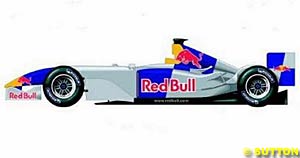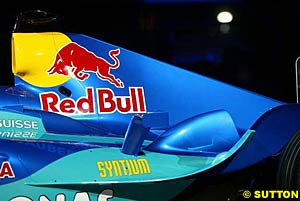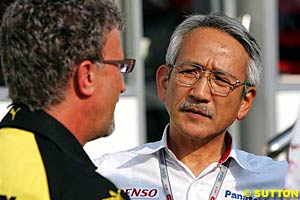Atlas F1 Magazine Writer
Fresh from the Formula One paddock
Whilst not (yet) confirmed by the FIA, all indications on Monday were that its 2005 Formula One World Championship will be graced by a grid of 20 cars. This is, of course, wonderful news for the category, for, just three days before, teams faced the very real prospect of having to make up numbers via third cars without a much as a properly pre-defined regulation by which to do so.
That Ferrari, BAR-Honda, Renault, Williams-BMW, McLaren-Mercedes, Sauber-Petronas and Toyota would be around was never in doubt; that one or all of the remainder would yield to the sorts of pressures that have seen over 100 F1 entities disappear from the scene in the 55-year history of the category, was a very real threat.
And, whilst the sale of Jaguar to Dietrich Mateschitz's energy drinks company, which enjoys an annual turnover of over $2bn through just 1850 employees, has been confirmed by the Ford accountants who unceremoniously pulled the plug on the Green Team in the first place, precious few details are available.
That no drivers have been confirmed is no surprise: during its transitional season, Red Bull Racing needs no more than a brace of capable journeymen, and a myriad such souls are available at well below their perceived market value. In addition, numerous emerging talents are strutting their stuff at present.
Then there is young Christian Klien who, despite regular lashings in the British media, proved to be more than a capable match for teammate Mark Webber at various times in his debut season. Klien's Austrian nationality is obviously no hindrance in an outfit wholly owned by a compatriot, one who almost single-handedly built his empire on the back of a brilliantly structured marketing campaign incorporating extreme sports of almost every genre.
Klien has another factor in his favour: Mateschitz is well known for his absolute loyalty to single causes, of which the Sauber/Enrique Bernoldi/Kimi Raikkonen triangle is a case in point. For 2001 Mateschitz had mentally earmarked a seat at Sauber - of which he was non-voting majority shareholder – for Brazil's Bernoldi. Peter Sauber, who had the final say in cockpit matters was hell-bent on the Finn.
A bizarre solution was reached: Mateschitz sold his shares in the team (Credit Suisse facilitated the sale and now owns them), but continued to sponsor Sauber whilst buying the Brazilian a drive in a Red Bull-bedecked Arrows. So, it was win-win all round: Sauber got Raikkonen and continued sponsorship, Bernoldi got a drive, and Mateschitz, who subsequently admitted to Austrian journalists without a trace of bitterness that Sauber's judgement had been correct, ultimately got his way, even if it meant disposing of his Sauber shares.
In fact, just recently, an Austrian source close to the bearded Mateschitz said that blind loyalty was the only failing he had ever sensed in the drinks tycoon. "Dietrich is blindly loyal to all those close to him, even if he detects flaws that work against him. If he knows somebody deserves the sack, he just cannot bring himself to do it."
But, returning to Sauber, the Swiss team have bagged what is thought to be the Jaguar entity's supply of Michelin tyres, meaning that Red Bull will most likely turn to Bridgestone, for, at least the 2005 season. But, no such indication was given at Monday's media conference, and this may well prove prudent, for a single-tyre supplier could still be confirmed for F1 in the near future.
On the engine front, details are qually hazy. Yes, a Cosworth will be used, with sources suggesting it would be an updated CR-6. (But, termed 'CR-7', or will the engine company's new owners, Kevin Kalkhoven and Gerald Forsythe, succumb to rampant egotism and change its type to one incorporating their initials?)
Whatever, indications are that it will be a convenience deal, and no more, for after all, the Red Bull RB1 was designed for Cosworth's 90º V10, and any redesign would prove extremely costly and restraining at this late stage. But, just why should the RB2 – and here it is refreshing to note that Mateschitz has steered clear of DM1 nomenclature – be designed for Cosworth power?
Already there are rumours that good friend and compatriot Gerhard Berger will join the team as special adviser, and the lanky Austrian has, forget not, extremely useful connections at BMW, which enjoyed its most successful recent seasons under his guidance. So, a Red Bull-BMW RB2 is not out of the question in 2006, particularly if V10 engines are retained by the formula, as BMW is hoping, until the end of the following season.
Another of the endangered teams to have bagged a one-year engine deal is Jordan, which agreed terms with Toyota at, literally, the last minute. Eddie Jordan was, as could be expected of a team boss whose ability to survive the winter was widely questioned, in ebullient mood on Monday after the Japanese company confirmed a supply of its RVX-05 engines for the coming season.
But, much like the RB1/Cosworth deal, there are more questions than answers. Why, for example did Toyota settle on a single-year deal? And, more importantly, why did the Japanese company state in its release that the agreement "would not result in a re-branding of the Jordan team in 2005 and the Toyota name and logo would not be used in conjunction with those of Jordan Grand Prix next season"?
Jordan and Toyota may, though, have decided on separate identities to facilitate the landing of an engine sponsor by Jordan, much as Sauber-Petronas relies upon Ferrari engines paid for by the Malaysian oil company.
But, none of that explains the rationale behind a single-year deal. Surely, if Jordan are to land an engine sponsor, a longer deal is vital to the viability of such an arrangement? So, once again, more questions than answers.
That, though, is not the case in the matter of Speed Investments Ltd (aka a trio of banks) versus Bernie Ecclestone's family trust, which controls Formula One despite holding just 25% of shares to their 75%.
Here there are rather more answers than questions if speculation is to be believed. It was not at all a matter of "first blood to the banks", nor did the financial institutions win management control of the Formula One Group, as some media sources have suggested.
Very simply, on Friday an appeal judgement was published which found that the banks had the right to have their challenge of Ecclestone's management style heard in the United Kingdom, as opposed to Switzerland, which was his favoured jurisdiction.
The matter had originally been heard in July and judgement in favour of the banks handed down in early August. Ecclestone, as is his right, did not agree with the judge's findings, and appealed that was the matter heard last week, no more and no less, so, if anything – and this is stretching license – last week's verdict may have been a case of "second blood".
Of course, Ecclestone must have reasons for strongly believing that Swiss rather than British justice should preside – somewhat strange, given his citizenship and nationality – but the mere fact that the matter will be heard in London and not Geneva does not guarantee a lost cause for Formula One's boss. Nor, for that matter, will a lost case mean the end of his "benevolent dictatorship" as he once termed his reign, for Britain's appeal system will be open to him yet again.
But, should he lose, and that is as conceivable as victory in this matter, then he may well leave the F1 trademark and its associated contracts to the banks, and go his own way. With Ecclestone having given his blessing to GP2 recently, could GP1 be the fall-back?

 By far the highest-profile operation of the three to commit to the 2005 season on Monday was Red Bull Racing, which, as is well known, bought Jaguar Racing – some allege for as little as £100, others for $1m. Whatever figure eventually disclosed, and Ford, as a public company will have to do so at some stage, it will be utterly misleading, for guarantees and sureties went unannounced or hidden in the depths of financial jargon.
By far the highest-profile operation of the three to commit to the 2005 season on Monday was Red Bull Racing, which, as is well known, bought Jaguar Racing – some allege for as little as £100, others for $1m. Whatever figure eventually disclosed, and Ford, as a public company will have to do so at some stage, it will be utterly misleading, for guarantees and sureties went unannounced or hidden in the depths of financial jargon.
 Mateschitz, though, continued sponsoring Sauber through to this season, with the Swiss operation continuously accepting that, one day, Mateschitz would purchase his own team and direct its destiny, thus ending one of F1's most synergetic deals. But, Mateschitz was commercially loyal to Sauber for ten years, so don't believe for a moment that Klien's future is precarious.
Mateschitz, though, continued sponsoring Sauber through to this season, with the Swiss operation continuously accepting that, one day, Mateschitz would purchase his own team and direct its destiny, thus ending one of F1's most synergetic deals. But, Mateschitz was commercially loyal to Sauber for ten years, so don't believe for a moment that Klien's future is precarious.
 There are, of course, paddock cynics who suggest that Toyota has no wish to be associated with the yellow team, whilst more realistic observers maintain that the Japanese company refuses to be associated with tobacco branding. This, though, is speculative: in Brazil a senior Gallaghers source advised that the company was not renewing its longstanding Benson & Hedges sponsorship of Jordan for 2005, whilst a team director insisted that it would. Subsequently B&H advised that it had taken no decision...
There are, of course, paddock cynics who suggest that Toyota has no wish to be associated with the yellow team, whilst more realistic observers maintain that the Japanese company refuses to be associated with tobacco branding. This, though, is speculative: in Brazil a senior Gallaghers source advised that the company was not renewing its longstanding Benson & Hedges sponsorship of Jordan for 2005, whilst a team director insisted that it would. Subsequently B&H advised that it had taken no decision...
|
Contact the Author Contact the Editor |
Please Contact Us for permission to republish this or any other material from Atlas F1.
|
Volume 10, Issue 46
Exclusive
Dinner in Paris with Pierre Dupasquier
Season Review
How Would F1 Score in Other Series
Season Strokes: 2004 in Review
Columns
On the Road
Elsewhere in Racing
The Weekly Grapevine
> Homepage |
